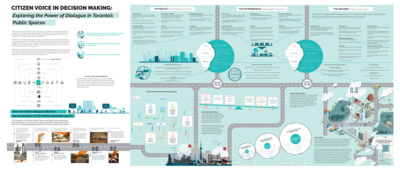Citizen Voice in Decision-Making: Exploring the power of dialogue in Toronto’s public spaces
Mohamed, Rimaz, Gawli, Ashwini, Perera, Kendra, Khan, Nafeha, Fernandes, Tanya and Dimachk, Manal (2022) Citizen Voice in Decision-Making: Exploring the power of dialogue in Toronto’s public spaces. In: Proceedings of Relating Systems Thinking and Design, RSD11, 3-16 Oct 2022, Brighton, United Kingdom.
![Mohamed_Citizen_Gigamap_2022.png [thumbnail of Mohamed_Citizen_Gigamap_2022.png]](https://openresearch.ocadu.ca/4338/1.hassmallThumbnailVersion/Mohamed_Citizen_Gigamap_2022.png)  Preview |
Image
Mohamed_Citizen_Gigamap_2022.png - Published Version Available under License Creative Commons Attribution Non-commercial No Derivatives. Download (11MB) | Preview |
Abstract
Public spaces are the lifeblood of a community, offering opportunities for socialization and community activities, facilitating the flow of movement across the city, and inspiring a sense of place and belonging. UNESCO (2017) refers to public space as “an area or place that is open and accessible to all peoples, regardless of gender, race, ethnicity, age, or socio-economic level”. It is this fundamental communal aspect that sets public spaces apart and makes them a vital part of the city.
Citizens stand to benefit the most from public spaces as extensions of their own living rooms outside the home. However, citizens possess little power to influence the planning and design processes.
The system map aims to visualise the complex realities of the stakeholder and influences that are involved in Toronto’s public spaces. This map explores how citizen dialogue can influence the social future of city streets and public spaces. The map takes the viewer on a journey that informs the influences the current system borrows from the past, observes the present situation, power dynamics and the actors who wield this power, and still envisions a better tomorrow. This system of urban spaces and city streets is layered and nuanced, with many factors, histories, and challenges, and there are many systemic barriers and delays that stand in the way of change.
It offers small-scale innovations which have the power to grow and eventually become embedded into the culture and processes of the overall system. It is our firm belief that individuals and small groups of people with the right tools can be the leverage points themselves for systemic change in their streets, neighbourhoods, communities, and cities.
Citizen dialogue is a powerful tool for the human-centred design, strategy, and planning of public spaces and will greatly influence the social future of a city’s human capital and quality of life. Cities are at the heart of many challenges we face today, but the solutions to these problems also lie at the heart of the cities.
| Item Type: | Conference/Workshop Item (Poster) |
|---|---|
| Uncontrolled Keywords: | systemic design, citizen action, public places, participatory policy, three horizons, urban planning, future of cities, Communities of Practice |
| Divisions: | Faculty of Design |
| Date Deposited: | 30 Apr 2024 14:11 |
| Last Modified: | 30 Apr 2024 14:11 |
| URI: | https://openresearch.ocadu.ca/id/eprint/4338 |
Actions (login required)
 |
Edit View |

 Lists
Lists Lists
Lists